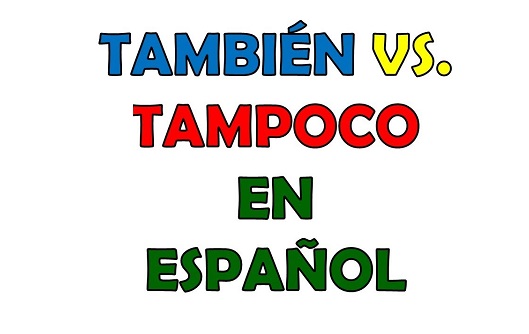In this lesson, we will talk about the differences between también and tampoco in Spanish. These are the two common adverbs in Spanish. While "también" is often translated as "also" or "too", "tampoco" often means "neither" in English. This lesson will help you know when and how to use tampoco and también.
Differences between También vs Tampoco in Spanish

Both también and tampoco are used to express that you agree with what someone says or to show that you feel the same way to do the same thing as they do. However, they have distinct uses.
- También is used to show agreement with a positive sentence.
- Tampoco is used to show agreement with a negative sentence.
Let's take a look at some examples below:
A: No quiero ir a la playa hoy. (I don’t want to go to the beach today.)
B: Tampoco. (Me neither.)
A: Quiero ir a la playa hoy. (I want to go to the beach today.)
B: También. (Me too.)
También in Spanish
También can be translated as "too" or "also" in English. It is used to agree to a positive or affirmative statement.
See the example below:
Daniel: Yo estudio español. (I study Spanish)
Peter: Yo también. (Me too)
Peter says "Yo también" because he is confirming that he also does the same thing as Daniel and Daniel's statement is positive.
You can use también as a response in other different ways.
For examples:
Ella también. (She does too.)
También quiero. (I want to, too.)
Yo también necesito más tiempo. (I need more time, too.)
Tampoco in Spanish
Tampoco can be translated as "neither" or "either" in English. It is used to express your agreement to negative statements in Spanish.
For example:
Daniel: Yo no estudio español. (I don't study Spanish.)
Peter: Yo tampoco. (Me neither.)
In the above example, Peter uses "Yo tampoco" because he is confirming that he doesn't study Spanish as Daniel and Daniel's statement is negative.
You can say "Yo tampoco" or repeat the rest of the sentence in order to emphasize your agreement saying “yo tampoco estudio español”.
Just like también, you can use tampoco as a response in several ways:
Marcos tampoco. (Marcos doesn’t either.)
Ella tampoco quiere. (She doesn’t want to either.)
Tampoco quiero ir a la playa hoy. (I don’t want to go to the beach today either.)
A: Yo no toco el piano.
B: Yo tampoco toco el piano.
Notes:
- When you use tampoco before the verb, you can't use "no" before that verb. So you can't say "Yo tampoco no fumo". You can just say "Yo tampoco fumo."
- You can only use "no" in the same sentences as "tampoco" if there are two negative statements.
For example: No come carne pero tampoco come pescado. (no come carne, no come pescado).
Adding a mí
When you respond to a statement with "gustar", también and tampoco take on a different form.
For example:
Me gustan mucho los perros. (I really like dogs.)
A mí también. (Me too.)
The phrase "a mí" is essential in the response in a sentence expressing like or dislike in Spanish. In the above example, a mí is used before también because the object of the sentence with gustar is the thing you like. And you can't use other subject pronouns or people's names in the response. So instead of using "yo", use "a mí". The same thing also applies with other subjects.
You can use the following phrases to talk about other people’s likes or dislikes:
A ti también / a ti tampoco.
A usted también / a usted tampoco.
A ella también / a ella tampoco.
A él también / a él tampoco.
A nosotros también / a nosotros tampoco.
A ustedes también / a ustedes tampoco.
A ellos también / a ellos tampoco.
Other examples:
A: A mí me gusta el chocolate.
B: A mí también. (You can't say "Yo también")
A: A Pedro no le gusta bailar.
B: A mí tampoco.
This rule also applies to some other pronominal verbs.
For examples:
A: Me interesa mucho la idea. (The idea really interests me.)
B: A mí también. (Me too.)
A: No me asustan las películas de horror. (Horror movies don’t scare me.)
B: A nosotros tampoco. (Us neither.)
